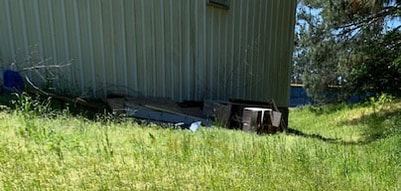 A few weeks ago, I took a walk through the abandoned playing fields of the high school near my home. Tender green leaves, gentle sunshine, and caressing breezes blurred and swept away thoughts of the invisible virus that seemed to lay in wait. The advent of spring and lack of maintenance had unleashed growth I didn’t believe possible on this once-manicured surface. Now, tiny three-petaled lavender flowers, golden dandelions, red and white clover, and leafy stalks obscured my running shoes. I recalled my grandma’s long-ago admonition to “mind where you put your feet––there’s snakes out there” as I ventured out to explore the forty acres of pasture and pines that encircled their small farm. Ever the rule-follower, even now I watched where I put my feet, stepping lightly so as not to crush the novel, verdant carpet, and was gratified to see the tiny blossoms spring upright behind me. Looking down, all was kelly green and lovely and blooming. Then I looked up. Ahead was a dilapidated storage shed flanked with broken boards, overturned buckets, and coiled netting caked with lichen. For writers, it’s where the main character would have found the body. I looked down at the field, then up at the shed, as if I were observing a vertical tennis match, then glanced around to see if anyone else was there and might be concerned about my mental health. But no, I was still alone. I pulled out my phone and took a few pics of the disparate scenes, thinking of one of my clients, a gifted author who writes mysteries, and wondered how she’d describe this setting. Would her character look across the field, missing or ignoring the hundreds of tiny flowers, and run to the tatty shed that concealed the victim? Or would the author draw out the scene, distracting the reader with fragrant blossoms until the character caught the unmistakable scent of decomposition? Of course, it depends on the author’s desires, the character’s arc, and multiple other factors. But I still wondered if the author would want her character to look down, or look up. As I pondered, I thought about perspective, such a useful word and concept, relating equally well to pandemics, life, and art. Here I am, out for a walk to escape the scourge, recalling happier times in my youth, and thinking about the craft of writing. Walking is a simple act that’s maintaining my perspective during a surreal time. It occurs to me a blog post about perspective might be helpful to other writers. And I cringe. Throughout my career, whether public relations or editing, I’ve been behind the scenes, hidden, the ballast the public doesn’t see, making my clients look great—and I embrace that role. As an editor, I help other writers craft their best possible work, from resolving daunting developmental issues to correcting misspelled words. I love my work, past and present, more than I could have imagined. What I didn’t imagine was that becoming an editor would shut down most of my own writing. At first, I thought it was the workload—after all, my priority is focusing on my clients and their writing. But after a few years passed and I still wasn’t writing, I had to admit it’s because I was afraid of not being “perfect.” After all, I’m an editor, dedicated to polishing and perfecting narrative until it shines. A few years ago, I came across an article where another editor had written about the importance of catching errors in blog posts, etc. There was an error in the first paragraph. I thought it was deliberate, but it wasn’t. There were a few more errors throughout. It happens, and it was another reminder that I didn’t want the public to catch my mistakes. Sharing work is an invitation for metaphorical snakes in the grass to judge, criticize, and shame—all those fears that keep writers from enjoying the writing process, submitting their work, and discussing it with editors. This is why my entire business is founded on supportive, uplifting, honesty-with-kindness editorial guidance. I would never subject a writer to any comment or action that made them feel “less than.” I’ve experienced that horror myself, and I wouldn’t wish it on anyone. Despite my fears, my first love was, and is, writing, and my muse is steadfast. Though I’m not writing on a keyboard or paper, I write in my mind and take notes. Still, I miss writing. I miss the bliss of my own writer’s high when the words whisper and flow as my fingers and heart race to capture their elusive beauty. I’m struggling to overcome the fear of sharing my writing, worrying it’s not my best work or it contains mistakes. The fact is, sometimes it won’t be my best work and sometimes it will contain mistakes. That’s writing, and I know that. I’ve coached many other writers through this very issue, so why can’t I do it for myself? I looked at the images of the field and shed on my phone and typed in a note: Perspective. I put my phone in my pocket, then looked up. To the right of the ramshackle shed, I noticed a slim, steep, path. Shaded beneath pine boughs, it disappeared into the woods. Intrigued, I took a few steps for a closer look. For a moment, the past beckoned; once again, I heard my grandma’s loving warning. I hesitated, examining the path. It was blanketed with fragrant needles and dotted with small rocks. It would be a challenging climb, but it wasn’t frightening. Plus, there wasn’t a snake in sight. It’s all about perspective. And mine, at last, had changed. Tentative, but resolved, I ventured forth to explore. |
AuthorMari Ann Stefanelli Archives
February 2023
Categories
All
|
 RSS Feed
RSS Feed